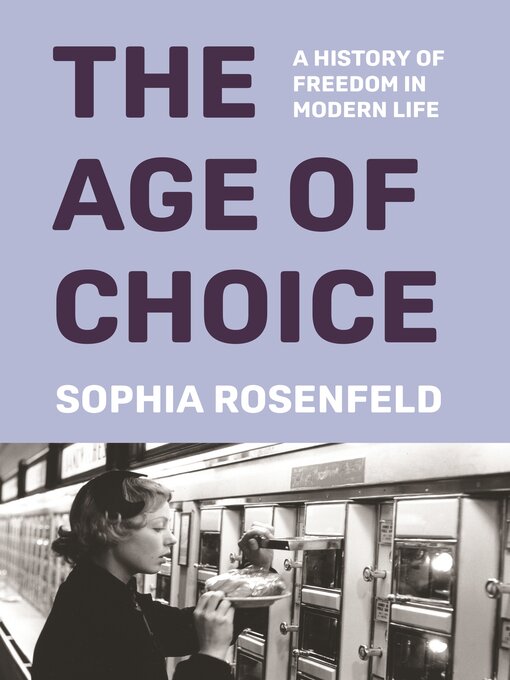A New York Times Book Review Editors' Choice
A sweeping history of the rise of personal choice in the modern world and how it became equated with freedom
Choice touches virtually every aspect of our lives, from what to buy and where to live to whom to love, what profession to practice, and even what to believe. But the option to choose in such matters was not something we always possessed or even aspired to. At the same time, we have been warned by everybody from marketing gurus to psychologists about the negative consequences stemming from our current obsession with choice. It turns out that not only are we not very good at realizing our personal desires, we are also overwhelmed with too many possibilities and anxious about what best to select. There are social costs too. How did all this happen? The Age of Choice tells the long history of the invention of choice as the defining feature of modern freedom.
Taking readers from the seventeenth century to today, Sophia Rosenfeld describes how the early modern world witnessed the simultaneous rise of shopping as an activity and religious freedom as a matter of being able to pick one's convictions. Similarly, she traces the history of choice in romantic life, politics, and the ideals of human rights. Throughout, she pays particular attention to the lives of women, those often with the fewest choices, who have frequently been the drivers of this change. She concludes with an exploration of how reproductive rights have become a symbolic flashpoint in our contemporary struggles over the association of liberty with choice.
Drawing on a wealth of sources ranging from novels and restaurant menus to the latest scientific findings about choice in psychology and economics, The Age of Choice urges us to rethink the meaning of choice and its promise and limitations in modern life.
-
Creators
-
Publisher
-
Release date
February 4, 2025 -
Formats
-
Kindle Book
-
OverDrive Read
- ISBN: 9780691261621
-
EPUB ebook
- ISBN: 9780691261621
- File size: 75130 KB
-
-
Languages
- English
-
Reviews
-
Library Journal
Starred review from January 1, 2025
When and why did choice come to be treated as a proxy for freedom, and how has it changed lives in the process? In 18th-century England, novels talked of a new activity: shopping. When shops appeared, they offered wares that enticed but weren't essential; auction catalogues and restaurant menus offered a profusion of options. Rosenfeld (history, Univ. of Pennsylvania; Democracy and Truth) argues that these changes were rooted in personal and social habits as much as in government action. Before the 18th century, freedom had mostly been seen as freedom from something--an onerous obligation--not freedom to have the opportunity to choose among competing goods. The Reformation highlighted the role of choice in embracing faith. For a few years, the French Revolution even made marriage a civil contract. Like other contracts, if not adhered to, it could be broken, as in a divorce. Across the 19th century, elections were increasingly conducted by ballot; no longer public affirmations but choices made on one's own. As arenas for choice expanded, so did restrictions to keep choice in bounds, even in such activities as the elaborate etiquette of ballroom dances. VERDICT This first-rate study of choice and freedom will appeal to most history lovers.--David Keymer
Copyright 2025 Library Journal, LLC Used with permission.
-
Formats
- Kindle Book
- OverDrive Read
- EPUB ebook
subjects
Languages
- English
Loading
Why is availability limited?
×Availability can change throughout the month based on the library's budget. You can still place a hold on the title, and your hold will be automatically filled as soon as the title is available again.
The Kindle Book format for this title is not supported on:
×Read-along ebook
×The OverDrive Read format of this ebook has professional narration that plays while you read in your browser. Learn more here.

